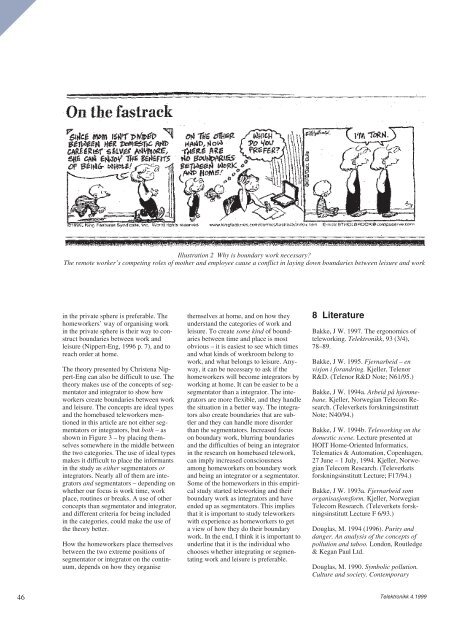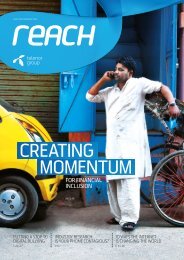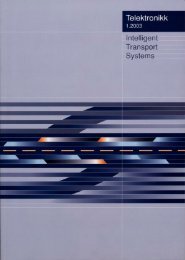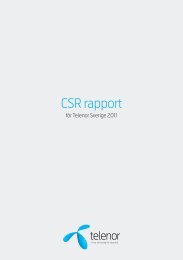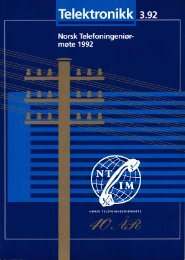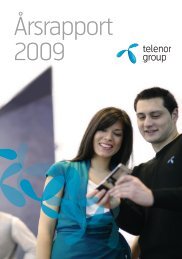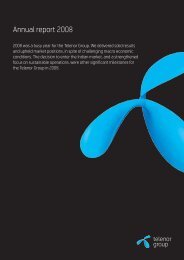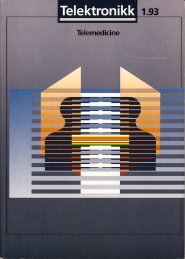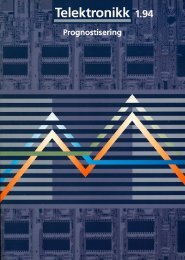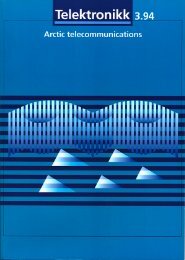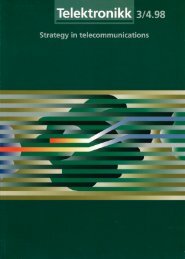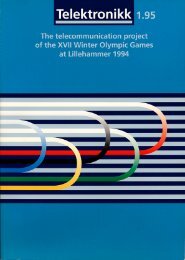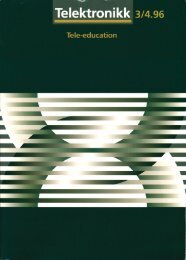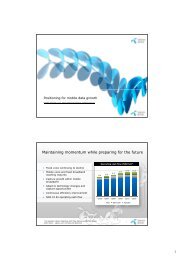Telework - Telenor
Telework - Telenor
Telework - Telenor
You also want an ePaper? Increase the reach of your titles
YUMPU automatically turns print PDFs into web optimized ePapers that Google loves.
46<br />
Illustration 2 Why is boundary work necessary?<br />
The remote worker’s competing roles of mother and employee cause a conflict in laying down boundaries between leisure and work<br />
in the private sphere is preferable. The<br />
homeworkers’ way of organising work<br />
in the private sphere is their way to construct<br />
boundaries between work and<br />
leisure (Nippert-Eng, 1996 p. 7), and to<br />
reach order at home.<br />
The theory presented by Christena Nippert-Eng<br />
can also be difficult to use. The<br />
theory makes use of the concepts of segmentator<br />
and integrator to show how<br />
workers create boundaries between work<br />
and leisure. The concepts are ideal types<br />
and the homebased teleworkers mentioned<br />
in this article are not either segmentators<br />
or integrators, but both – as<br />
shown in Figure 3 – by placing themselves<br />
somewhere in the middle between<br />
the two categories. The use of ideal types<br />
makes it difficult to place the informants<br />
in the study as either segmentators or<br />
integrators. Nearly all of them are integrators<br />
and segmentators – depending on<br />
whether our focus is work time, work<br />
place, routines or breaks. A use of other<br />
concepts than segmentator and integrator,<br />
and different criteria for being included<br />
in the categories, could make the use of<br />
the theory better.<br />
How the homeworkers place themselves<br />
between the two extreme positions of<br />
segmentator or integrator on the continuum,<br />
depends on how they organise<br />
themselves at home, and on how they<br />
understand the categories of work and<br />
leisure. To create some kind of boundaries<br />
between time and place is most<br />
obvious – it is easiest to see which times<br />
and what kinds of workroom belong to<br />
work, and what belongs to leisure. Anyway,<br />
it can be necessary to ask if the<br />
homeworkers will become integrators by<br />
working at home. It can be easier to be a<br />
segmentator than a integrator. The integrators<br />
are more flexible, and they handle<br />
the situation in a better way. The integrators<br />
also create boundaries that are subtler<br />
and they can handle more disorder<br />
than the segmentators. Increased focus<br />
on boundary work, blurring boundaries<br />
and the difficulties of being an integrator<br />
in the research on homebased telework,<br />
can imply increased consciousness<br />
among homeworkers on boundary work<br />
and being an integrator or a segmentator.<br />
Some of the homeworkers in this empirical<br />
study started teleworking and their<br />
boundary work as integrators and have<br />
ended up as segmentators. This implies<br />
that it is important to study teleworkers<br />
with experience as homeworkers to get<br />
a view of how they do their boundary<br />
work. In the end, I think it is important to<br />
underline that it is the individual who<br />
chooses whether integrating or segmentating<br />
work and leisure is preferable.<br />
8 Literature<br />
Bakke, J W. 1997. The ergonomics of<br />
teleworking. Telektronikk, 93 (3/4),<br />
78–89.<br />
Bakke, J W. 1995. Fjernarbeid – en<br />
visjon i forandring. Kjeller, <strong>Telenor</strong><br />
R&D. (<strong>Telenor</strong> R&D Note; N61/95.)<br />
Bakke, J W. 1994a. Arbeid på hjemmebane.<br />
Kjeller, Norwegian Telecom Research.<br />
(Televerkets forskningsinstitutt<br />
Note; N40/94.)<br />
Bakke, J W. 1994b. <strong>Telework</strong>ing on the<br />
domestic scene. Lecture presented at<br />
HOIT Home-Oriented Informatics,<br />
Telematics & Automation, Copenhagen,<br />
27 June – 1 July, 1994. Kjeller, Norwegian<br />
Telecom Research. (Televerkets<br />
forskningsinstitutt Lecture; F17/94.)<br />
Bakke, J W. 1993a. Fjernarbeid som<br />
organisasjonsform. Kjeller, Norwegian<br />
Telecom Research. (Televerkets forskningsinstitutt<br />
Lecture F 6/93.)<br />
Douglas, M. 1994 (1996). Purity and<br />
danger. An analysis of the concepts of<br />
pollution and taboo. London, Routledge<br />
& Kegan Paul Ltd.<br />
Douglas, M. 1990. Symbolic pollution.<br />
Culture and society. Contemporary<br />
Telektronikk 4.1999


